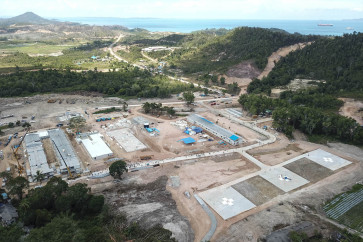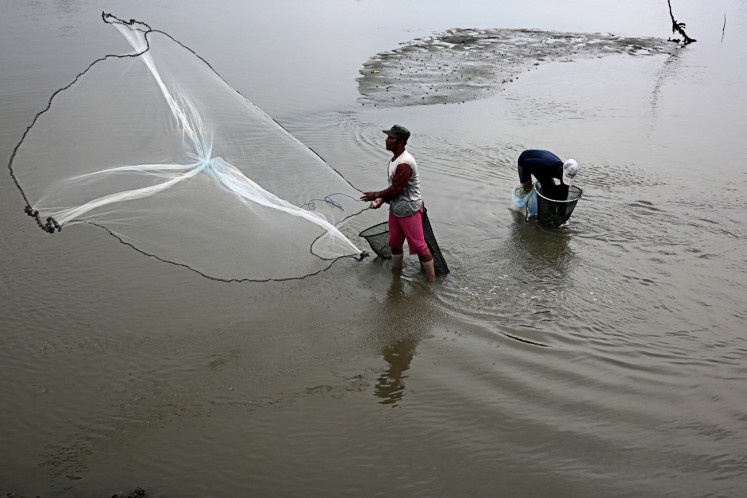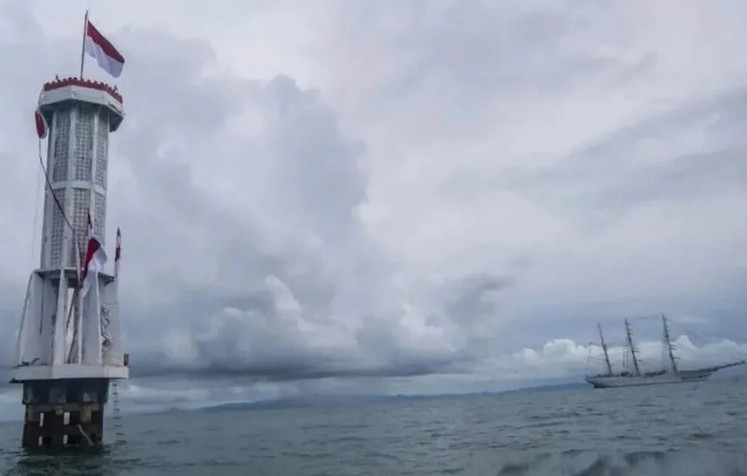Popular Reads
Top Results
Can't find what you're looking for?
View all search resultsPopular Reads
Top Results
Can't find what you're looking for?
View all search resultsWhale shark spot temporarily closed
Up close: Residents play with a whale shark in waters off Botubarani village in Gorontalo
Change text size
Gift Premium Articles
to Anyone
U
span class="caption">Up close: Residents play with a whale shark in waters off Botubarani village in Gorontalo. Tourists have been flocking to the area to see seven whale sharks that often visit due to quality water and a good food supply.(Antara/Adiwinata Solihin)
An area frequented by whale sharks in Botubarani village waters in Bone Bolange regency, Gorontalo province, Sulawesi, has been temporarily closed to tourists after three of the seven whale sharks known to inhabit the area were reportedly hit and injured by visitors’ boats.
“The injuries caused the sharks to behave more aggressively,” said Wawan Iko, an official with the Gorontalo Diving Sport Association.
Wawan said his association and the province’s fisheries and maritime affairs agency had found a male whale with significant injuries — 13 slashes on its body — believed to be caused by visitors’ boats, which have been increasing in number.
He said the closure of the spot was to allow a zoning border to be put in place: a square area about 100 meters from the beach. “Later, visitors will only be able to look at the whales only from outside the area.”
Gorontalo Governor Rusli Habibie said boats and divers would be banned from entering the zoned-off area, which would be guarded by officers from the water police and the military.
In the last two weeks, the usually quiet village had become crowded with people hoping to see the sharks.
They mostly come to the beach in the afternoon, when the small herd of whale sharks came looking for food around the coast.
Visitors rent boats from locals for about Rp 20,000 (US$1.40) per trip. Some come fully armed with diving equipment and waterproof cameras.
Locals say that four whale sharks, known locally as munggiango hulalo, had routinely looked for food near the village for quite some time. Three others are also frequently seen with the herd.
A shrimp processing factory is located in the subdistrict, just 20 minutes’ drive from Gorontalo, the provincial capital. The factory disposes of its waste into the sea, a practice that is considered to have attracted the tame animals to the area, as they often eat what the factory throws away.
Despite the positive impact of tourists on the local economy, many have expressed fear that overcrowding might cause the whale sharks stress, particularly as many visitors often try to touch them when they come to the surface for food. Some visitors even use noisy motorized boats to approach them.
A number of locals reported that some of the whale sharks were injured, most probably because of friction with boats.
“This could be a blessing but it could also be a disaster,” diver and journalist Debby Hariyanti Mano of Gorontalo said.
She said a regulation was urgently needed to protect the whale sharks from excessive visitors.
Quoting the World Wildlife Fund (WWF), she said that special guides were needed for the visitors, containing basic information on the animals.
Visitors, she said, had to maintain a distance of at least 5 meters from the whale sharks when swimming with them. They are also not allowed to make noises or sudden movements or splash water on the animals.
WWF, she said, also limited scuba diving to two scuba divers at a time per group of six.
Whale sharks are protected animals according to Marine and Fisheries Ministerial Decree No. 18/2013. They are also on the “red list” of the International Union for Conservation of Nature (IUCN) and are categorized as vulnerable. Though the animals are known for their long lifespan, they have low fecundity and population growth.
Wawan Iko of the Indonesian Divers Association (POSSI) in Gorontalo said that the group had been trying to sit down with locals to come up with rules for the area.
He said that in the future a subdistrict bylaw was needed to regulate both economic activity in the area and the preservation of the whale sharks.










